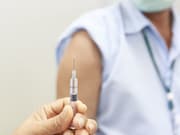Estimated first-dose vaccination coverage varied from 14 to 98 percent in 10 university outbreaks
THURSDAY, Feb. 14, 2019 (HealthDay News) — Achieving high serogroup B meningococcal (MenB) vaccination coverage is recommended following university-based outbreaks of meningococcal disease caused by serogroup B, according to a study published online Feb. 13 in the U.S. Centers for Disease Control and Prevention Emerging Infectious Diseases.
Heidi M. Soeters, Ph.D., M.P.H., from the CDC in Atlanta, and colleagues reviewed university-based outbreaks of meningococcal disease caused by serogroup B and vaccination responses in the years following availability of MenB vaccine.
The researchers found that during 2013 to 2018, there were 10 university-based outbreaks in seven states, which resulted in 39 cases and two deaths. The universities at which outbreaks occurred had 3,600 to 35,000 undergraduates. The number of outbreak cases varied from two to nine; duration of outbreaks varied from zero to 376 days. MenB vaccination was implemented by all 10 universities: Seven used MenB-4C and three mainly used MenB-FHbp. There was noted variation in the estimated first-dose vaccination coverage from 14 to 98 percent. In five outbreaks, additional cases occurred six to 259 days following initiation of MenB vaccination.
“Efforts are under way to better understand MenB vaccine effectiveness and duration of protection, MenB vaccine strain coverage, and current risk factors for meningococcal disease among university students,” the authors write. “This information, along with lessons learned when implementing MenB vaccination campaigns, could help guide and improve responses to future outbreaks.”
Copyright © 2019 HealthDay. All rights reserved.








